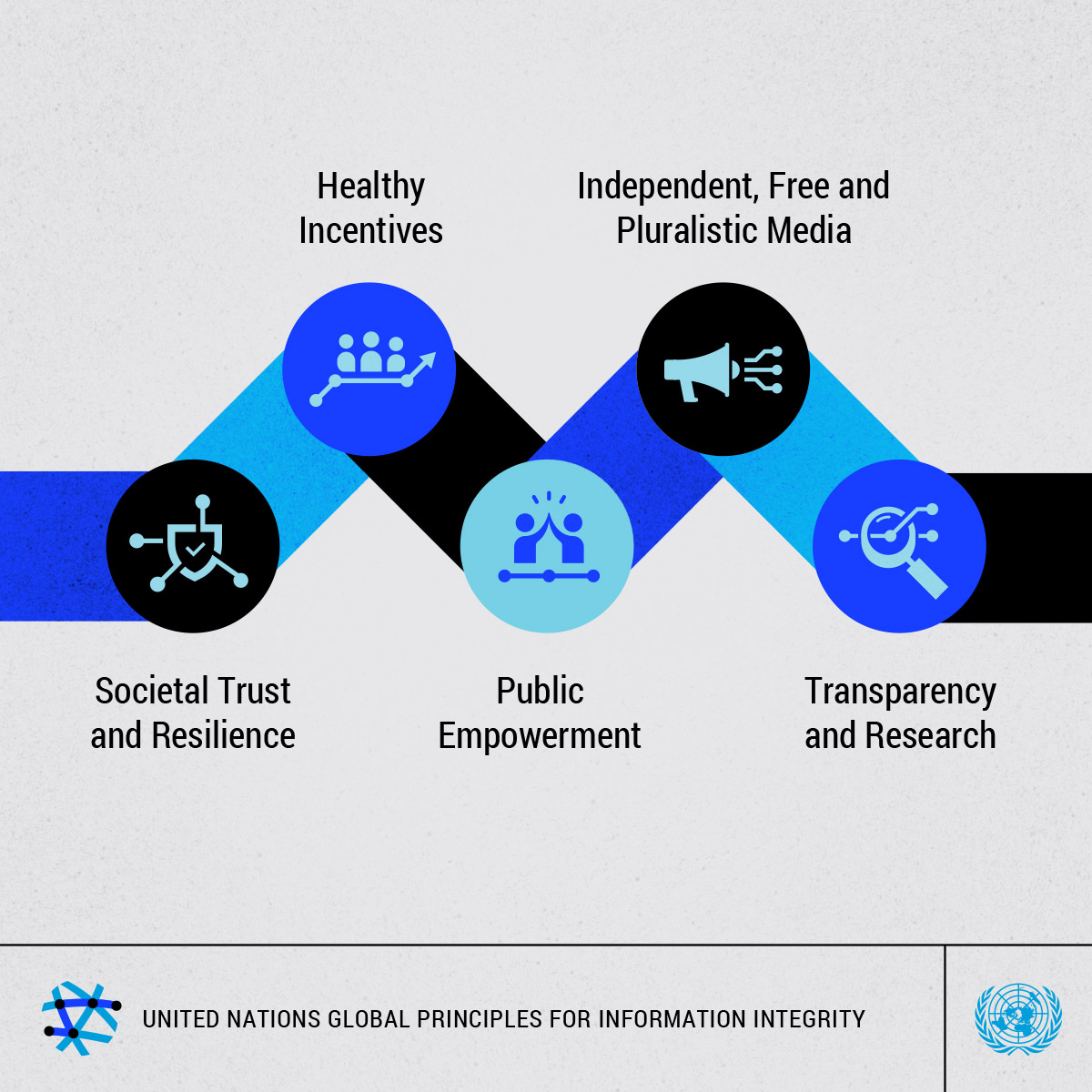Governance
UN Global Principles for Information Integrity
- 27 Jun 2024
- 7 min read
For Prelims: United Nations Secretary-General, Online Misinformation, Disinformation, Hate Speech, United Nations Global Principles for Information Integrity, Sustainable Development, Climate Related Action, AI Technologies
For Mains: Impact of misinformation and disinformation on societal unity and integrity.
Why in News?
Recently, the United Nations Secretary-General unveiled a set of ‘United Nations Global Principles for Information Integrity’ aimed at curbing the spread of online misinformation, disinformation, and hate speech.
- These guidelines are designed to address the widespread harm caused by false information on digital platforms.
What are the United Nations Global Principles for Information Integrity?
- These principles form the foundation of a vision for a more humane information ecosystem. The initiative aims to prioritise human rights and support sustainable development, climate action, democracy, and peace.
- The 5 Global Principles for Information Integrity are as following:
- Societal Trust and Resilience: Building societal trust and resilience to counteract the spread of misinformation and hate speech.
- Independent, Free, and Pluralistic Media: Ensuring media independence, freedom, and diversity to support high-quality journalism and diverse viewpoints.
- Healthy Incentives: Creating incentives that promote truthful and constructive content while discouraging the spread of harmful misinformation.
- Transparency and Research: Enhancing transparency and supporting research to understand and mitigate the impact of misinformation and to develop effective solutions.
- Public Empowerment: Empowering the public with the tools and knowledge to critically assess information, protect their rights, and participate in the information ecosystem responsibly.
Initiatives Taken Combat Misinformation and Disinformation
What are the Challenges Associated with Humane Information Ecosystem?
- Speed and Scale of Misinformation Spread: Digital platforms and AI technologies have accelerated the spread of misinformation and hate speech, causing rapid and widespread harm.
- For example State media outlets in Venezuela spread pro-government messages through AI-generated deepfake videos.
- Impact on Social Cohesion and Democracy: False narratives and distortions undermine social cohesion, breed cynicism, disbelief, and disengagement, and damage the integrity of elections.
- According to the Global Risk Report 2024, misinformation and disinformation are among the top five risks identified.
- Reinforcement of Prejudices: Opaque algorithms create information bubbles that reinforce prejudices, including racism, misogyny, and various forms of discrimination.
- For example algorithms creat eco-chamber effect which tend to show users content similar to what they’ve engaged with before.
- It reinforces preconceived views or biases, making it harder for them to consider alternative viewpoints.
- Targeting of Vulnerable Groups: Women, refugees, migrants, minorities, and activists often face targeted harassment and humiliation.
- Monetisation of Harmful Content: Advertisers and the PR industry often profit from harmful content, exacerbating the spread of misinformation.
- Weak Protections for Journalists: Journalists face threats and lack strong protections, which impacts their ability to report accurately and freely.
Misinformation, Disinformation and Hate Speech
- Misinformation:
- Misinformation is false or inaccurate information shared without intending to cause harm.
- Example of misinformation is when someone shares an outdated weather forecast, believing it to be current.
- Misinformation is false or inaccurate information shared without intending to cause harm.
- Disinformation:
- Disinformation refers to intentionally false or misleading information that is disseminated with the purpose of deceiving or misleading others.
- Example: A fake news website publishes a fabricated story about a public health crisis to cause panic and distrust among the population.
- Hate Speech:
- Hate Speech refers to offensive discourse targeting a group or an individual based on inherent characteristics such as race, religion, or gender, and that may threaten social peace.
- It typically involves epithets, malicious stereotypes, and statements intended to incite hatred or violence against a particular group.
Way Forward
- Accountability of Big Tech Companies: Big Social Media companies must acknowledge the damage their products cause and take steps to mitigate harm by changing business models that profit from disinformation and hate.
- Responsible Advertising and PR Practices: Advertisers and PR agencies should stop monetising harmful content, seek clients who do not mislead or harm the planet, and work to strengthen information integrity.
- Improving Content or Information Standards in Media: Media outlets should raise content or Information standards to ensure quality journalism based on facts and reality, and find advertisers who support truthful content.
- Government Commitment to Free Media: Governments should commit to creating and maintaining a free, independent, and plural media landscape, ensuring strong protections for journalists, and upholding human rights in regulations.
- Public Empowerment: The public should demand accountability, choice, and control over their information environments to ensure free expression without fear of attack and to avoid being manipulated by algorithms.
- Collective Action: Collaboration among all actors, including tech companies, advertisers, media, governments, and the public, is crucial to protecting information integrity and achieving the Sustainable Development Goals (SDGs).
|
Drishti Mains Question: Discuss the "United Nations Global Principles for Information Integrity" and how they aim to address the challenges posed by online misinformation, disinformation, and hate speech. |
UPSC Civil Services Examination Previous Year Question (PYQ)
Mains
Q. What do you understand by the concept of “freedom of speech and expression”? Does it cover hate speech also? Why do the films in India stand on a slightly different plane from other forms of expression? Discuss. (2014)





